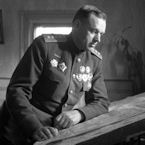janh
Posts: 1216
Joined: 6/12/2007
Status: offline

|
quote:
ORIGINAL: 76mm
I should also point out that another reason for Sov runaways is that it just doesn't make sense to try to hold cities once they are threatened by encirclement--why bother, if they will be dead in a week?
I'm reading Glanz' book, Barbarossa Derailed, and he is talking about a three week siege of Mogilev, which held 10-12 divisions. Can you imagine? Stick three puny WitE rifle divs in Mogilev and you can be CERTAIN that tney will be POWs in a week (if the German bothers to attack them, that is). If you want to give Sovs some incentive to stand and fight, part of the solution must be to allow encircled units more ability to survive, and defend themselves, and hold up the Germans, for longer.
Good point, very good actually. The only reason for the Soviets to fight forward and possibly to counterattack feverishly despite very uneven odds can be the time factor. The evacuation of facilities is not limiting, as it wasn't limiting back then. I also don't believe that the political/propaganda side of surrendering cities is critical as both sides knew how to set up proper propaganda coups for any mishaps.
My thinking is that they might have countered so decisively either because they believed that they had the means to stop the Wehrmacht (meaning they lacked the exact knowledge of forces, reinforcements, combat values and the future as we do now), and/or because they saw in this a means to weaken the Wehrmacht and delay it so that new, stronger rearward defensive lines could be prepared.
This delaying would be the effect that in my opinion would be missing to some degree here. Imagine if the "out-of-supply and command" effect of pocketing wasn't just that instantaneous for the next turn, but the penalty would add up turn by turn. Turn 1 75% of MP, command, supply, turn 2 50 and turn 3(+) 25%. That would probably introduce the pocket reduction fight that are in the books, and would delay the infantry, which also is a fact.
Hence, this might require the lead Panzers to stop now and then, and possibly even assist in securing the pocket borders or participate in reducing them, taking attrition casualties that are commonly avoided by good Axis players presently. On a positive note, this also would reduce the harm to overextended, isolated Axis spearheads, which wouldn't turn so weak, basically instantly (from the viewpoint of the opponent in his next turn).
That sounds like an idea to explore, at least for future titles.
The idea with the MP cost to the defender was along the same lines, i.e. binding the enemy like for example the role that the Armored Cavalry Regiments, scouts etc. had in the past, and possible even in present doctrine. Think of the 2nd ACR in Desert Storm. This effect is also absent with the present I-Go-U-Go system. Imagine that every deliberate attack, cost the defender the combat MPs (i.e. 2 or 3). You could half that penalty for hasty attacks, or double it or whatever in detail. To ensure the defending unit would still be able to disengage and move off a little within the 1-week time frame of the next turn, you could cap that "penalty" so that MPs for Inf are maximally reduced to say 10 and that of the rest to say 20. Then Soviet players would have some gain from attacking even if the losses were terrible, and the dynamics of 1941 might change dramatically. The disadvantage would be that the Axis would have to bite the same bullet later. But this "abstracted rule" would be plausibly based on the real world mechanisms.
Nothing for this title anymore, certainly, but sounds like a good approach in order to improve the I-go-U-go system in the next ones. The I-go-U-go isn't ideal, but probably best for a game to be kept "relatively simple". I think it has future but it can also be improved by other rules, such as this reaction move discussion that was there earlier (and in essence was also just a means to reduce the chance of getting pocketed too easily).
LATE EDIT: btw, thinking about delaying, this would also give rise to a critical difference to an Axis withdrawal during blizzard. The latter had probably little point besides avoiding to loose material and the arguable risk of a total breakdown of the Wehrmacht line, and a lot of Generals seemed to have pushed for quicker retreats including Guderian (which got him sacked). Although both forward holding strategies came top down from Hitler or Stalin, it would seem that in the Soviet case it appears more sensible whereas in the German case it looks more like a mistake. Of course no one knows this for sure. A game mechanic that would cost a defender MPs, would also result in this logic. The Germans, if used in the same fashion as in history and being overextended and weakend, i.e. ripe for a blizzard counteroffensive, would have no use in holding ground or even countering, whereas the Soviet would. Doesn't sounds that bad in mimicking this whole issue, does it?
< Message edited by janh -- 5/8/2012 4:08:55 PM >
|
 Printable Version
Printable Version














 What you say is undoubtedly true.
What you say is undoubtedly true.  New Messages
New Messages No New Messages
No New Messages Hot Topic w/ New Messages
Hot Topic w/ New Messages Hot Topic w/o New Messages
Hot Topic w/o New Messages Locked w/ New Messages
Locked w/ New Messages Locked w/o New Messages
Locked w/o New Messages Post New Thread
Post New Thread